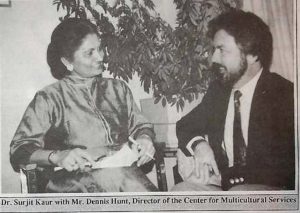
About six months ago, during the course of my search for an appropriate community service organizations that best served the needs of a growing immigrant communities from South Asia, | discovered the Center for Multicultural Human Services (CMHS), in Falls Church, Virginia. CMHS is a nonprofit organization serving to the mental health and social services needs of the international community in the Washington metropolitan area.
Range of Services
It provides a wide range of services to the families and especially students through contacts with the Fairfax County Department of Community Action. These services include cross cultural counseling services, cross cultural training and consultation, treatment programs for traumatized children, parenting programs, abuse treatment programs, alcohol and drug education and counseling, independent living skills training and vocational/employment counseling.
The multilingual capability of the CMHS staff is the key to the effective support of the culturally diverse student and parent population of the two schools. CMHS also works with language minority children refused by schools and courts throughout Northem Virginia. At present, under the RAP, CMHS staff and volunteers (recruited and trained at CMHS) are providing positive life experiences and support for over 400 teenagers. Volunteers are supporting tutoring, literally training, children’s groups, and other CFI related activities. More intensive and ongoing long time relationships between the youth at risk and the CMHS volunteers are encouraged through the mentoring program.
Congenial Atmosphere
CMHS provides a warm, friendly environment, like that of a joint or extended family in a Punjabi village, where children can get advice from an educated uncle — Dr.Dennis Hunt, clinical psychologist and the director of MHS, cry on the shoulders of grandpa — Robert, the coordinator, whose office is one of the busiest place. Then there is Dr.Sarah Shaoee, a clinical therapist who is known for the miracles she works with her clients who come to her asking for advice in marital crises. She uses her skills to alleviate their miseries and helps them to regain lost confidence, love for each other and for their dear ones, By the time they are through, most walk a bouquet of flowers or a picture painted for her in gratitude for saving them from, growing pitfalls,
Motherly, Dr.Rouyan Jones is ever ready to receive you in her office, to listen, showing love and compassion, and render her considered advice and counsel when all other doors have been closed to them. She reminds one of Mother Teresa, encountering pain with her love, anger with forgiveness, and loneliness with precious friendship.
Other professionally trained and nobly inspired therapists including Becky Hamilton, who has seen the underworld of youth playing with the fire of drugs alcohol, and violence and has pulled them out of the abysmal pits of degradation, A petite young Mireong Lee, and Kiem Lee, who specialize in educating ethnic youth and adults about the effects of alcohol and the consequences of driving under alcoholic “influence.” Young Daniel Cruz, the office manager, renders “Service with a smile.”
Minorities’ Problems
Dr.Dennis Hunt, the director of the CHMS is himself a white American, belonging to the mainstream social and ethnic value system. 1 wondered what brought him here. | asked him, “How did you personally get involved with the problems of ethnic minorities?” Dr.Hunt probably has had to answer this question to many people, except perhaps his family, sofuy answered, “I grew up in N.Y., in the neighborhood of immigrants communities, where | myself was minority so I got concerned about these communities,” he went to school in Texas where it was just the opposite. He studied many different languages, taught at the university in Brazil and when he came back to the United States, he got actively involved in promoting equal rights of cultural minorities, Later he combined his active interest in immigrants with his formal training as a clinical psychologist, and ever since he has been a crusader for minorities, Being on the Board of Directors of the local Mental Health Association he addressed the mental health needs of immigrant minorities and immigrants. He wrote articles in newspapers, and got funding for programs specifically meant for minorities. He feels gratified to note that the general public has become more aware about the minority issues, and the “System” has started responding. Dr.Huntrightly takes a sense of pride in what he has been able to accomplish almost single handed.
“The squeaky wheel gets the oil,” said Dr.Hunt and related an incident when 200 parents of deaf children made so much noise, that they got special programs instituted in the educational setting in this country, and when we see thousands and thousands of immigrants in our community and they have no voice to argue their case.
Realizing that Dr.Hunt is an extremely busy person, I asked my last question, which was on my mind all the time and concerned the status and role of Sikh Community in this country.”
“When you are a minority, the only strength you have is of being together, working together, toward a common goal.” The Sikhs seem to have a unity of purpose and they are serious about retaining their identity in midst of cultural diversity here. They have the refreshingly unique practice of equality of all members in their Gurdwaras.” And now I started feeling a little embarrassed at the generous complements being bestowed on our beloved community.
As I think of the interview with Dr.Dennis Hunt, lam reminded of the words of John Donne.
“No man is an island entire of it self, every man is a piece of the continent, a part of the main; any person’s diminishes me, because1 am involved in mankind. And therefore never send to know for whom the bell tolls; it tolls for
Note: The author Dr.Surjit Kaur is currently developing programs for South Asian, specially Indian and Pakistani communities. Services will be provided in English, Punjabi, Hindi and Urdu. For more information call CMHS at (703) 5333302
Article extracted from this publication >> May 21, 1993